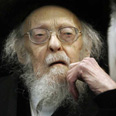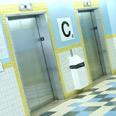

Rabbi Elyashiv: Don't use Shabbat elevators
Senior haredi halachic arbiters make new ruling against using designated elevators for Shabbat, saying 'direct exertion is created related to doing work according to the Bible' and that 'it is related to a grave prohibition against actual desecration of the Sabbath.' Head of Tzomet Institute for Halacha and Technology: I'm glad public doesn't buy unexplained religious injunctions
Senior haredi rabbis, led by "the generation's decider" Rabbi Yosef Shalom Elyashiv, published a religious injunction Tuesday forbidding the use of Shabbat elevators.
According to the rabbis, a professional opinion they received proves that "it is related to a grave prohibition against actual desecration of the Sabbath." Even though such elevators have been controversial for years, no halachic decision has yet to be issued in the haredi public until now. This is the first sweeping halachic ruling made on the issue by Rabbi Elyashiv.
Shabbat elevators are elevators designated for use especially on Shabbat when observant Jews do not use electricity or other activities deemed as work according to tradition. Such elevators are preset to stop at every floor, eliminating the need to press any buttons, thus circumventing the religious prohibition against using electricity.
Controversy surrounding their use has revolved around the issue of the amount of tension required for the elevator to do its work and whether it is kept constant when additional passengers enter the elevator car. Other opinions hold that a healthy person should not resort to circumventing the laws of Shabbat by performing an otherwise prohibited activity in a technically permissible manner. Also, observant Jews are required to avoid giving the outward appearance of not observing Torah commandments, which could be questionable if using a Shabbat elevator.
The religious injunction, signed by Rabbi Nissim Karelitz, Rabbi Chaim Kanievsky, and Rabbi Shmuel Halevy Wosner, claimed: "Here a written and oral technical opinion was brought before us from experts and certified elevator technicians and engineers. It was made clear to us that using these elevators – either in ascent or descent – direct activation is created regarding doing work according to Torah. No institute or likewise that makes these things kosher should be trusted."
Rabbi Elyashiv, who also signed the injunction, added, "On the issue of Shabbat elevators, it is also my opinion that they should not be used, nor in ascent nor in descent, on Shabbat."
A "Shabbat elevator law" was passed by the Knesset in 2001 stipulating that planning and building ordinances in all residential and public buildings that have multiple elevators require that a special Shabbat module be installed in one of the elevators. Installation of such a module is avoided in many haredi population centers because of the controversy surrounding Shabbat elevators. The law is simply ignored in many other places.
'Obligation to hear other side'
In a conversation with Ynet, head of the Tzomet Institue for Halacha and Technology Rabbi Yisrael Rozen attacked the haredi ruling, saying, "The elementary thing in halacha and ethics is to hear the other side. On this issue, there is most definitely another side. The law obligates that the injunction be backed up. In the past, there also were unexplained announcements with distinguished signatures. I'm glad the majority of the public does not buy halachic rulings in this manner."
Rabbi Rozen explained that the traditional controversy surrounding Shabbat elevators revolves around descending in them, when, more stringent observers claim, body weight affects the elevators' speed. Rozen and others believe that using electricity for refrigerators, which haredim themselves use, is much more halachically problematic.
The Tzomet founder emphasized that he relies on the halachic ruling of the late Rabbi Shlomo Zalman Auyerbach and "students from the same school." He said that he knows of no fundamental changes that have occurred recently regarding Shabbat elevators. He added, "If we receive information that casts doubt on our method, we will not hesitate to say so and correct (our stance) according to the letter of the law)."















